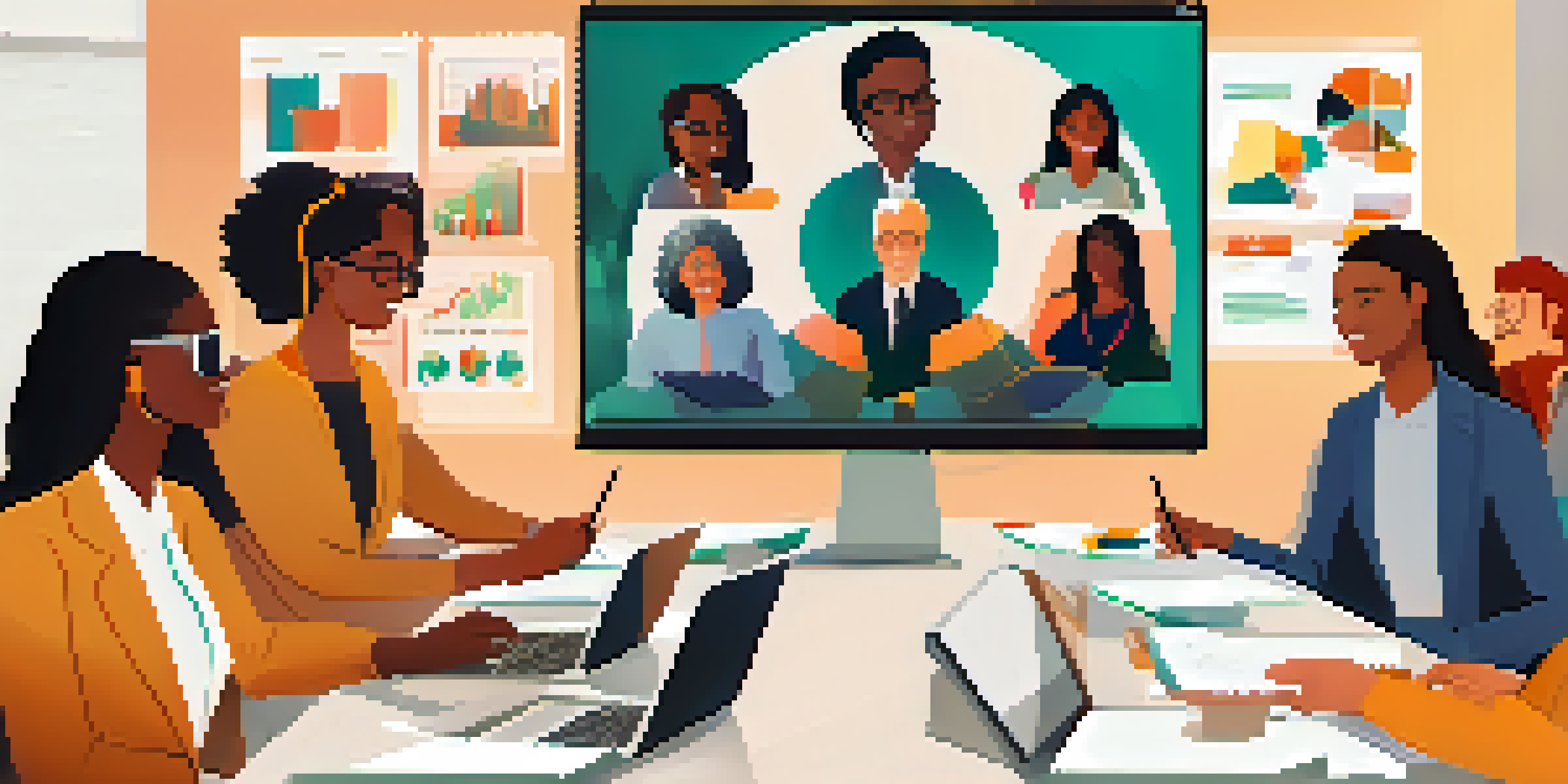Social Learning and its Impact on Group Dynamics

Defining Social Learning and Its Key Principles
Social learning is a theory that suggests individuals learn behaviors and norms by observing others. This process involves imitation and modeling, where people replicate actions of peers or role models. By understanding what is considered acceptable or effective within their group, individuals adapt their own behavior accordingly.
Tell me and I forget. Teach me and I remember. Involve me and I learn.
One key principle of social learning is the concept of observational learning, where an individual learns by watching the experiences of others. For instance, a new employee might observe how their colleagues handle client interactions before adopting a similar approach. This method not only fosters skill development but also enhances group cohesion as members align their behaviors.
Furthermore, social learning emphasizes the importance of reinforcement. When individuals observe positive outcomes following a behavior, they are more likely to imitate that behavior. This cycle of learning can significantly influence group dynamics, as shared success stories encourage a collective approach to problem-solving.
The Role of Group Dynamics in Social Learning
Group dynamics refer to the interactions and relationships that develop within a group. These dynamics can significantly impact how social learning occurs, as individuals often feel more comfortable engaging in learning behaviors in a supportive environment. For example, a team that encourages open communication creates a space where members are more likely to share and adopt new ideas.

Positive group dynamics promote trust and collaboration, which are essential for effective social learning. When individuals feel valued and supported, they are more inclined to participate actively, leading to richer learning experiences. This collaborative effort not only enhances individual skill sets but also strengthens the overall performance of the group.
Social Learning Boosts Group Skills
Observational learning and reinforcement significantly enhance individual skills and group cohesion.
On the flip side, negative group dynamics can hinder social learning. If there is competition or conflict among members, individuals may be less willing to share knowledge or seek help. This can create silos within the group, ultimately stifling innovation and collective growth.
The Impact of Leadership on Social Learning
Leadership plays a crucial role in facilitating social learning within groups. Effective leaders model behaviors that they wish to see in their teams, setting a standard for others to follow. For instance, a leader who actively seeks feedback and demonstrates vulnerability encourages team members to do the same, fostering an environment of continuous learning.
The greatest danger in times of turbulence is not the turbulence; it is to act with yesterday's logic.
Moreover, leaders can create opportunities for social learning through structured activities such as team-building exercises or collaborative projects. These initiatives not only promote skill sharing but also help build relationships among team members, enhancing group dynamics. When leaders invest in these activities, they signal the importance of collective learning and growth.
However, if leaders are disengaged or fail to support social learning initiatives, it can lead to stagnation within the group. Team members may feel unsupported and hesitate to share ideas or collaborate, resulting in missed opportunities for innovation and improvement.
Social Learning in Virtual Environments
With the rise of remote work, social learning has found new avenues in virtual environments. Online platforms facilitate observation and interaction among team members, allowing for continued learning despite physical distances. For example, virtual meetings and collaborative tools enable individuals to learn from one another in real-time, mirroring the dynamics of in-person interactions.
However, the effectiveness of social learning in virtual spaces often relies on the intentional design of these interactions. If teams do not engage in regular communication or fail to create a culture of sharing, the benefits of social learning can diminish. Establishing routines, such as virtual brainstorming sessions, can help maintain engagement and foster a sense of community.
Leadership Shapes Learning Culture
Effective leaders foster social learning by modeling desired behaviors and creating collaborative opportunities.
Additionally, virtual environments can sometimes lead to feelings of isolation, which can impede social learning. It’s essential for teams to prioritize relationship-building activities, ensuring that members feel connected and supported, even from a distance.
Barriers to Effective Social Learning in Groups
Despite its benefits, there are several barriers that can hinder effective social learning in groups. One common obstacle is the fear of judgment or criticism, which can prevent individuals from sharing ideas or asking for help. This fear often stems from previous negative experiences, leading to a reluctance to engage in collaborative learning.
Another barrier is a lack of time or resources. In fast-paced environments, individuals may prioritize immediate tasks over learning opportunities. This mindset can lead to a culture where continuous improvement takes a backseat, ultimately affecting group performance and innovation.
Lastly, diversity within a group can present both challenges and opportunities for social learning. While diverse perspectives can enrich discussions, they can also lead to misunderstandings if not managed effectively. Encouraging open dialogue and creating a safe space for all voices can help bridge these gaps and enhance the learning experience.
Strategies to Enhance Social Learning in Groups
To promote effective social learning, groups can implement various strategies that encourage collaboration and knowledge sharing. One effective approach is to create mentorship programs, where experienced members guide newer ones. This not only facilitates skill transfer but also strengthens interpersonal relationships, enhancing group dynamics.
Another strategy is to leverage technology to facilitate social learning. Tools such as collaborative platforms and social networks can serve as spaces for knowledge exchange and discussion. By integrating these resources into daily workflows, teams can create a culture of continuous learning that resonates with everyone.
Barriers Hinder Collaborative Growth
Fear of judgment and lack of resources can obstruct effective social learning, impacting overall group performance.
Finally, fostering a growth mindset within the group can significantly enhance social learning. Encouraging individuals to view challenges as opportunities for development helps create an environment where experimentation and learning are valued, ultimately driving collective success.
Measuring the Impact of Social Learning on Group Performance
Evaluating the impact of social learning on group performance is vital for understanding its effectiveness. One way to measure this is through feedback surveys, which can gauge members' perceptions of their learning experiences. By gathering insights on what works well and what could be improved, groups can refine their social learning initiatives.
Additionally, tracking performance metrics can provide tangible evidence of social learning's impact. For example, monitoring project outcomes and team productivity before and after implementing social learning strategies can highlight significant changes. This data-driven approach not only validates the importance of social learning but also helps in making informed decisions for future initiatives.

Ultimately, the success of social learning in groups is reflected not just in performance metrics but also in the quality of relationships among team members. A collaborative and supportive environment fosters trust and encourages individuals to share knowledge freely, leading to a more innovative and effective group.